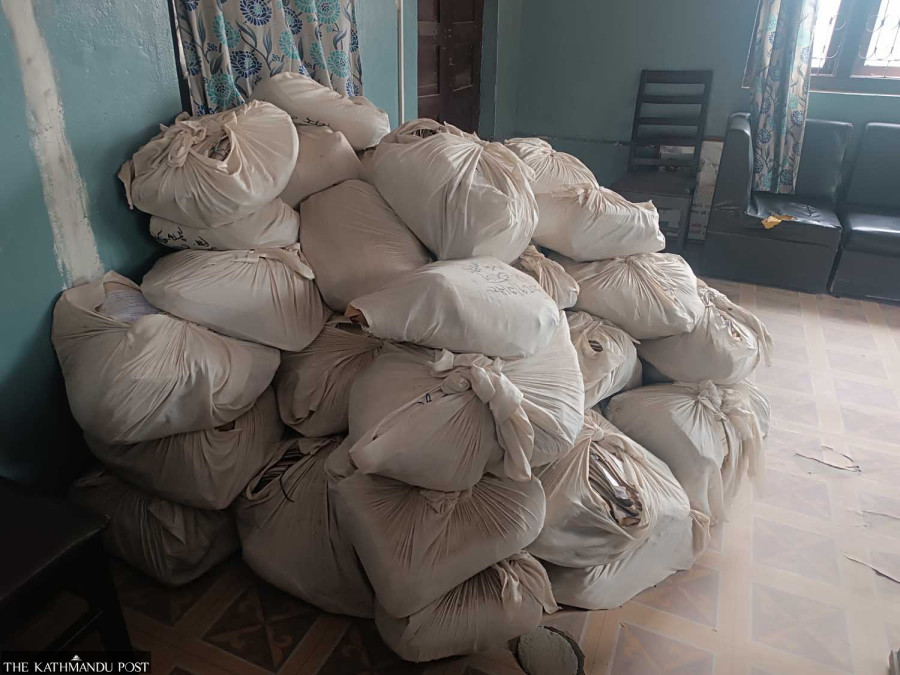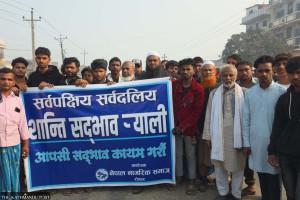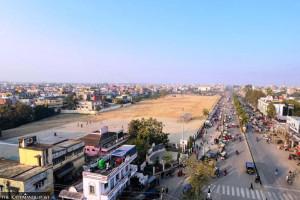Madhesh Province
Justice eludes loan-sharking victims as cases gather dust
As over 15,000 complaints remain stuck in the Dhanusha District Administration Office, victims of predatory lending accuse the state of inaction.
Kamalesh Thakur
Hundreds of victims of usurious lending, locally known as meter byaj, are still waiting for justice in Dhanusha, where over 15,000 complaints lie unresolved, gathering dust in government offices.
Inside the first-floor office of the District Administration Office (DAO) in Dhanusha, a room adjacent to the staircase is stacked with over 300 files on the table. In the corner, documents packed in white cloth bundles lie unattended. These bundles, officials confirm, contain more than 15,000 cases of loan-sharking—complaints that have never moved beyond the paperwork stage.
According to Sagar Rayamajhi, a police officer, a total of 16,754 complaints regarding illegal money lending have been filed so far, but only 1,071 have been settled. “This means 15,683 complaints remain untouched,” he said. Of the 3,760 cases registered in fiscal year 2023-24, only 28 percent were resolved. Worse, none of the cases filed in 2024-25 (around 13,000 cases) have even been reviewed.
The government had announced a crackdown on loan sharking in 2023, following mass protests across the Madhesh region, particularly in Dhanusha, Mahottari and Siraha districts. Loan sharking had driven thousands into poverty and landlessness, with informal lenders charging up to 60-100 percent annual interest rates. In the wake of public outrage, the government amended laws to criminalise unlicensed money lending and set up complaint mechanisms. However, victims say these promises have fallen flat.
Authorities claim that it takes time to study and investigate the complaints as many of such complaints are false. “Not all complaints are genuine, and that takes time to verify. Nearly 20 percent of resolved cases have been found to be false, lodged out of personal grudges by debtors,” said Majhi, adding that lack of human resource to verify the reported complaints.
Chief District Officer (CDO) Shankar Hari Acharya admits progress has been slow. “We only manage to mediate around 4-5 cases daily. Settlement is difficult when both parties refuse to compromise,” Acharya said. According to him, with just three police officers handling thousands of cases, the backlog has continued to swell. “Our role is limited to facilitation. We cannot force either party,” he added.
Advocacy groups, however, accuse the government of intentional inaction. Manoj Pasawan, the general secretary of the Farmers and Labourers Movement Against Loan Sharking, said the government completely ignored the concerns of the victims of predatory lending. “The government is trying to silence the victims. If it does not address these issues soon, the movement will intensify,” he said.
Pasawan added that many victims are facing further trauma, and even contemplating suicide, due to the prolonged delay. “People have endured social humiliation and violence for two years because of the government's indifference.”
The crisis extends to the judiciary. According to Kailash Prasad Bhattarai, the registrar at the District Court, Dhanusha, a total of 2,401 cases related to loan sharking were registered in the court in the last fiscal year of 2024-25. Court proceedings have been hampered by legal loopholes and court orders.
Advocate Rinku Kumari Yadav explained that after victims file complaints, lenders are summoned by the police, and sometimes detained to pressure them into returning land deeds or property documents. “However, lenders often secure interim injunctions from the court and walk free. Police can’t proceed after that,” she said. Yadav also highlighted that cases often pile up because even after settlements, defaulters fail to repay on time, pushing disputes back to the court.
Adding to the complexity, the implementation of laws against loan sharking remains weak. Victims accuse authorities of being reluctant to enforce court verdicts. “There is a clear lack of political will. Lenders with strong political ties continue to harass poor families while government agencies remain passive,” claimed Pasawan.
Several news reports have documented how the loan shark racket traps farmers and labourers in a vicious cycle of debt, with many being forced to sell their land at throwaway prices or migrate abroad for survival. Despite nationwide protests and pledges by successive governments, meaningful relief remains elusive.
Government efforts, such as the formation of district-level committees to mediate loan disputes and promises of zero-tolerance policies, have largely been ineffective. Victims are now threatening to resume street protests, accusing the state of ignoring their plight.
Following the nationwide protest, even in Kathmandu, by the loan shark victims, the government had formed the commission under the leadership of the former chairman of the Special Court, Gauri Bahadur Karki in April 2023 to address the demands of loan shark victims.
The commission, formed as per a five-point deal reached with loan shark victims, has been given three months to prepare a concrete and practical report and recommend solutions to resolve the problems of loan shark victims. But the victims are still left in lurch.




 8.22°C Kathmandu
8.22°C Kathmandu















